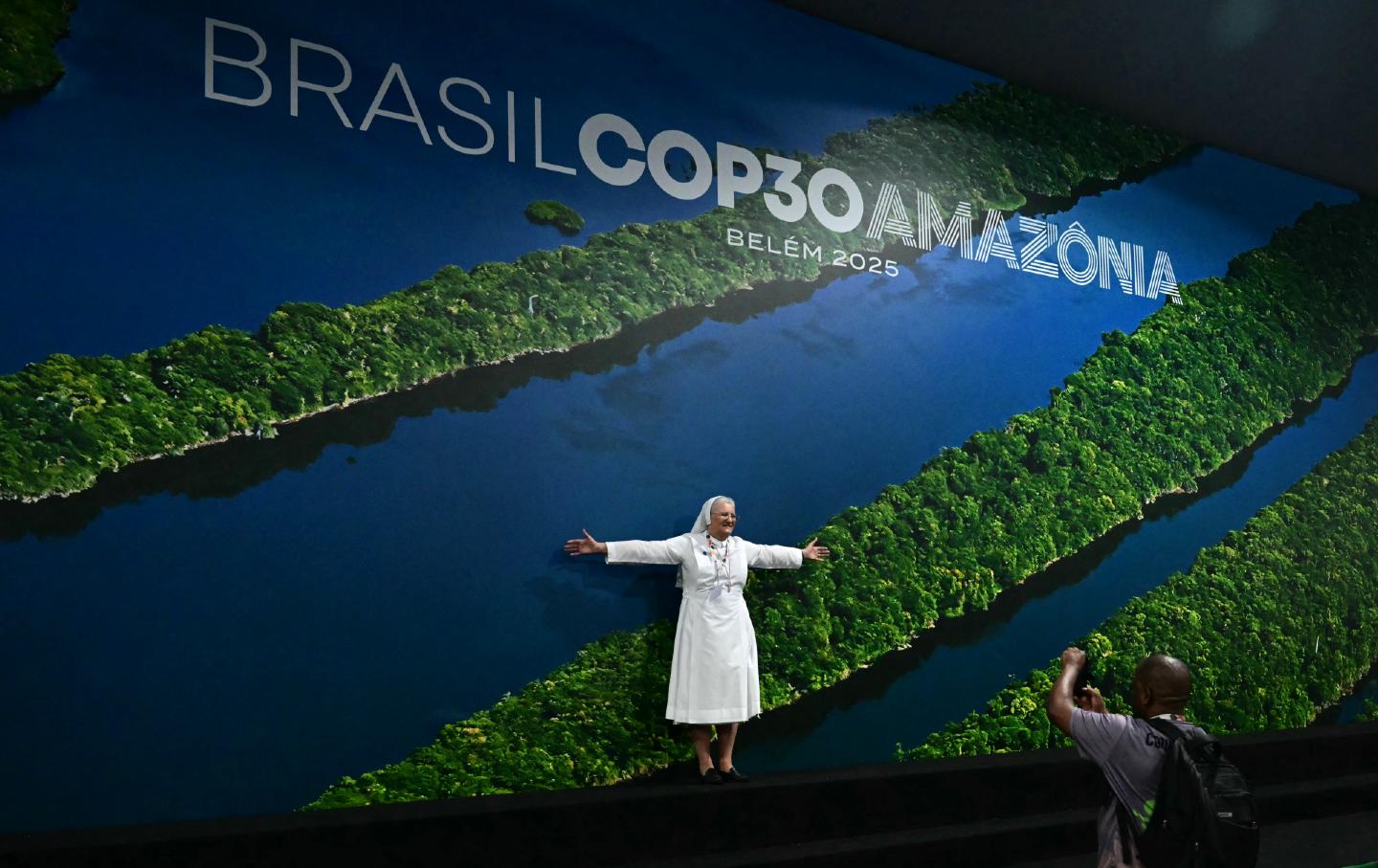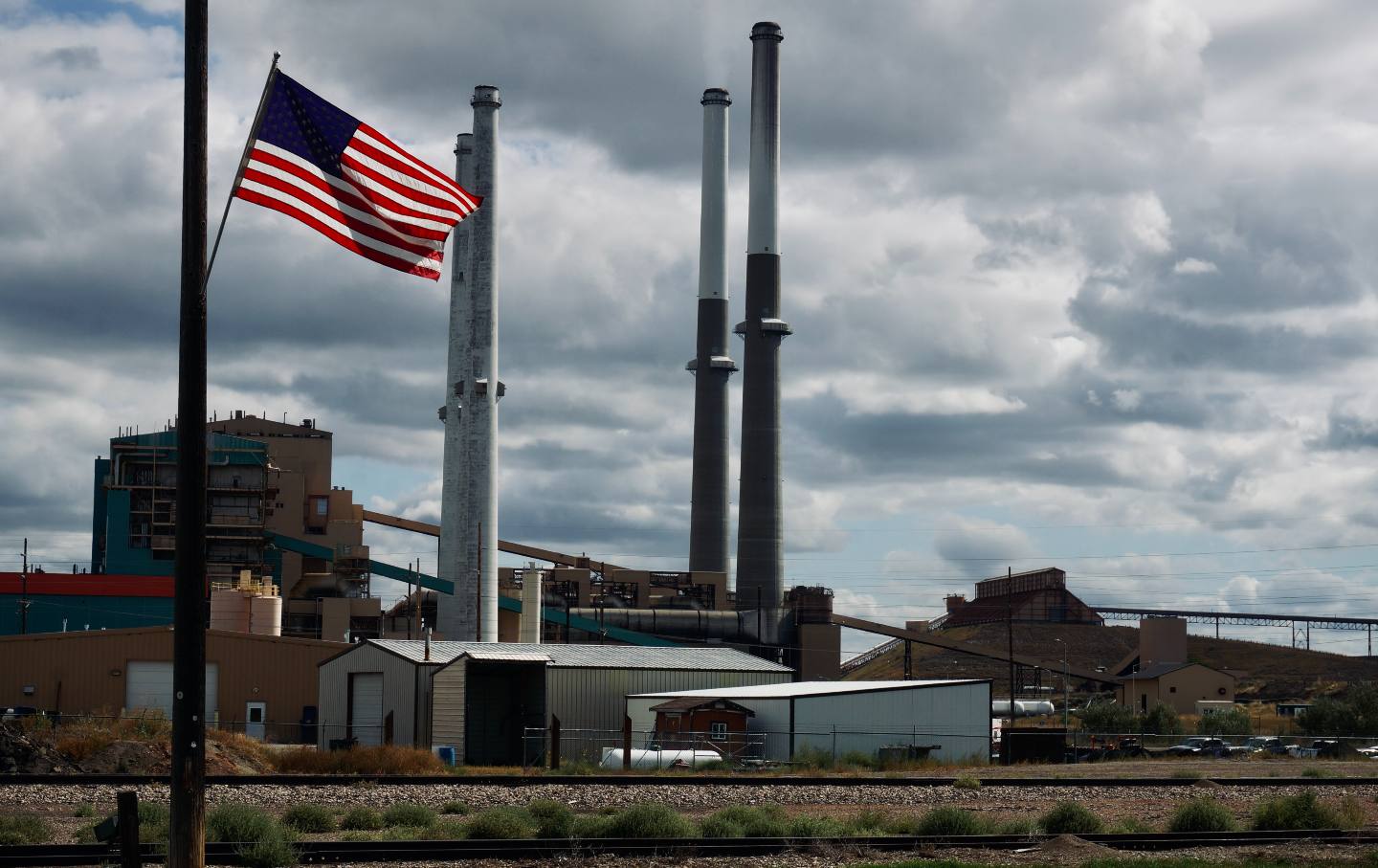Big Oil Is Greenwashing the Planet
The hosting of the recent COP28 climate summit by the United Arab Emirates is just one instance.

This article originally appeared at TomDispatch.com. To stay on top of important articles like these, sign up to receive the latest updates from TomDispatch.com.
A recent opinion poll rocked the world of the Big Oil lobbyists in their proverbial thousand-dollar suits and alligator shoes. The Pew Research Center found that 37% of Americans now feel that fighting the climate crisis should be the number one priority of President Joe Biden and Congress, and another 34% put it among their highest priorities, even if they didn’t rank it first. Companies like ExxonMobil and countries like Saudi Arabia have tried since the 1990s to gaslight the public into thinking climate change was either a total fantasy or that the burning of coal, natural gas, and petroleum wasn’t causing it. Having lost that battle, the fossil-fuel lobbyists have now fallen back on Plan B. They want to convince you that Big Oil is itself swinging into action in a major way to transition to—yes!—green energy.
The hosting of the recent COP28 climate summit by the United Arab Emirates, one of the world’s leading petroleum exporters, exemplified exactly this puffery and, sadly enough, it’s just one instance of this greenwashing world of ours. Everywhere you look, you’ll note other versions, but it certainly was a classic example. Emirati businessman Sultan Ahmed al-Jaber served as president of the Dubai-based 28th Conference of Parties—countries that had signed onto the United Nations Framework Convention on Climate Change (UNFCCC) in Rio de Janeiro in 1992. While his green bona fides include his role as chairman of the board of the UAE’s green energy firm Masdar, controversy swirled around him because he’s also the CEO of ADNOC, the UAE’s national petroleum company. Worse yet, he’s committed to expanding the oil and gas production of his postage-stamp-sized nation of one million citizens (and eight million guest workers) in a big-time fashion. He wants ADNOC to increase its daily oil production from its present four million barrels a day to five million by 2027, even though climate scientists stress that global fossil-fuel production must be reduced by 3% annually through 2050 if the world is to avoid the most devastating consequences of climate change.
Meanwhile, since COP28 was held in the heart of the petroleum-producing Middle East, it also platformed bad actors like Saudi Arabia, which led the charge to stop the conference from committing to ending the use of fossil fuels by a specific date. The awarding of COP28 to the Emirates by the UNFCCC Secretariat allowed a whole country, perhaps a whole region, to be greenwashed, a genuinely shocking decision that ought to be investigated by the U.N.’s Office of Internal Oversight Services. (And next year, it looks like COP29 will be hosted by another significant oil producer. In other words, the oil countries seem to be on a hot streak!)
Imaginary Algae
Mind you, those Gulf oil states are anything but the only major greenwashers on this planet. After all, the private sector has outdone itself in this arena. A congressional investigation into the major oil companies produced a long report and an appendix that came out last year, including internal corporate emails showing repeated and systemic bad faith on the subject of climate change. ExxonMobil executives, for instance, had publicly committed their company to the goals of the 2015 Paris Agreement to keep the increase in the average surface temperature of the earth to no more than 1.5° Centigrade (2.7° Fahrenheit) above the pre-industrial era. Although a 1.5-degree increase might sound small, keep in mind that, as a global average, it includes the cold oceans of the higher latitudes, the North and South Poles, and the Himalayas. In already hot climates like South Asia and the Middle East, that means over time it might translate into a stunning 10- to 15-degree increase that could make some places literally unlivable.
Scientists worry that exceeding that level could throw the world’s climate system into full-scale chaos, producing mega-storms, substantial sea level rise, ravaging wildfires, and deadly heat and drought over large parts of the earth’s surface. Still, despite his public commitment to it in 2019, the CEO of ExxonMobil, Darren Woods, asked an oil industry lobbying group to delete a reference to the 2015 Paris climate agreement from the draft of a statement on sustainability it had prepared. That mention, Woods said, “could create a potential commitment to advocate on the Paris agreement goals.” So much for oil company pledges!
In a similar fashion, in 2020, executives of the London-based Shell PLC asked public relations employees to highlight that the company’s vow to reach zero net carbon emissions by 2050 was “a collective ambition for the world,” rather than a “Shell goal or target.” As a company executive admitted all too bluntly, “Shell has no immediate plans to move to a net-zero emissions portfolio over our investment horizon of 10-20 years.” (Oh, and in case you missed this, the profits of the major fossil-fuel outfits have in recent years gone through the roof.)
Nor is corporate greenwashing simply a matter of public pronouncements by oil company executives. ExxonMobil has run a multi-million-dollar campaign of television and streaming advertising attempting to pull the wool over people’s eyes about what it’s doing. In one instance, it paid The New York Times to run an extended commercial gussied up as if it were a news article, a shameful procedure to which the Times acquiesced. Studies show that most readers miss disclaimers about such pieces actually being paid advertisements. It was entitled, “grand plant waste to fuel a sustainable energy future.” The advertisement was extremely misleading. As Chris Wells, an associate professor of emerging media studies at Boston University’s College of Communication, told BU Today last February, “Exxon is doing a lot of advertising around its investments in algae-based biofuels. But these technologies are not yet viable, and there is a lot of skepticism that they ever will be.”
In fact, about a month after Wells gave that interview, ExxonMobil admitted publicly that it had pulled out of algae biofuels research entirely at the end of 2022, having invested about $29 million a year over 12 years. It spent more millions, however, in advertising to give the public the impression that this paltry investment outweighed the company’s multi-billion-dollar efforts to bring ever more petroleum online.
The environmentalist group Client Earth notes that ExxonMobil spends between $20 billion and $25 billion annually looking for—yes, of course!—new oil fields and is committed to doing so through at least 2025. The company had a net profit of $55.7 billion in 2022. In other words, it’s still devoting nearly half of its annual profits to looking for more petroleum when, of course, it could be using them to launch its transition to sustainable forms of energy. Such—to put it politely—inertia is clearly unwise. New electric vehicle sales in the United States soared to about a million this year alone, and EVs will have avoided using 1.8 million barrels of oil in 2023. Better yet, the cost of battery packs for the vehicles fell 14 percent and is expected to keep heading down, guaranteeing that EVs will be ever more affordable over time. Moreover, in significant parts of the rest of the world, as The New York Times reported recently, electric-powered two- and three-wheeled vehicles are beginning to give the giant oil companies a run for their money. In the decades to come, ExxonMobil’s inflexibility and refusal to innovate will undoubtedly doom the company, but the question remains: In the process, will it doom the rest of us, too?
A Deceptive Greenwashing Marketing Campaign
In another, better world, the courts could punish the oil majors for their greenwashing. That misleading paid ad in The New York Times forms but one cornerstone of a wide-ranging lawsuit against ExxonMobil by the state of Massachusetts, initiated in 2019, which has so far survived that company’s legal challenges. As the office of Attorney General, Andrea Campbell explains, it is “alleging that the company violates Massachusetts law through a deceptive ‘greenwashing’ marketing campaign that misleadingly presents Exxon as a leader in cutting-edge clean energy research and climate action…and…its products as ‘green’ while the company is massively ramping up fossil fuel production and spending only about one-half of 1 percent of revenues on developing clean energy.” Campbell, an African-American born in Boston, is keenly aware that climate change is an equity issue, since its deleterious effects will initially be felt most strongly among the less privileged. (Of course, given our present Supreme Court, don’t hold your breath on this one.)
Popular
“swipe left below to view more authors”Swipe →In its complaint, the state points to marketing campaigns like those featured on ExxonMobil’s YouTube channel, which still shows an ad produced eight years ago, “Making the World’s Energy go Further,” that, in just 30 seconds, presents a medley of greenwashing’s greatest early hits—algae biofuel, “new technology for capturing CO2 emissions,” and cars twice as efficient in their gas mileage. Algae biofuels, however, have by now bitten the dust; there is no affordable and safe method of capturing and storing carbon dioxide; and electric cars are between “2.6 to 4.8 times more efficient at traveling a mile compared to a gasoline internal combustion engine,” according to the Natural Resources Defense Council.
The biggest fault in such commercials, however, is that the oil company’s ad makers were trying to convince the public that ExxonMobil was putting major resources into sustainable alternatives. As the state of Massachusetts points out, in reality “ExxonMobil has ramped up production and reportedly is now the most active driller in the Permian Basin, the shale oil field located in western Texas and southeastern New Mexico that yields low-cost oil in months, rather than the years required for larger offshore projects to begin producing crude… ExxonMobil has invested billions of dollars into the development of massive Canadian oil sands projects, which are among the costliest and most polluting oil extraction projects in the world.”
Carbon Capture and Lake Nyos
An even more dangerous scam than algae biofuels (implausible but not life-threatening) is the idea of carbon capture and storage (CCS). Remind me: Why would we try to store billions of tons of a poisonous gas? On August 21, 1986, subterranean carbon dioxide deposits bubbled up through Lake Nyos in Cameroon, killing nearly 2,000 people, thousands of cattle and other animals, and in the process turned four local villages into graveyards. Some scientists fear similar underground carbon dioxide storage elsewhere could set off earthquakes. And what if such quakes in turn release the gas? Honestly, since I still remember the 1989 Exxon Valdez disaster where 11 million gallons of oil, spilled into the waters off Alaska, wrecked hundreds of miles of shoreline and killed unknown numbers of sea creatures and birds, I’d just as soon not have ExxonMobil store carbon dioxide in my neighborhood.
Worse yet, most of the CO2 harvested by oil companies so far has been injected into drill sites to help bring in—yes, you guessed it!—more petroleum. Worse yet, studies have shown that carbon-capture technology itself emits a lot of carbon dioxide, that it can only capture a fraction of the CO2 emitted by fossil fuels, and that just shutting down coal, fossil gas, and petroleum production and substituting wind, solar, hydro, and batteries is far safer, cheaper, and better for the environment.
Carbon capture is, however, a favorite greenwashing tool of Big Oil, since company executives can pretend that a technological breakthrough somewhere on the horizon justifies continuing to spew out record quantities of CO 2 in the present moment. Senator Joe Manchin (D-W.Va.) wasted billions of taxpayer dollars by including provisions for CCS research and development in Joe Biden’s otherwise admirable Inflation Reduction Act. In the process, he managed to insert a key greenwashing technique into even the most progressive climate legislation ever passed by an industrialized hydrocarbon state.
As for Sultan Al-Jaber, the head of COP28, he let his mask slip in November in a testy exchange with former Irish President Mary Robinson, who had invited him to an online discussion of how women’s lives could be improved if the climate crisis were effectively addressed. When she urged him to act as president of COP28, he exploded: “I’m not in any way signing up to any discussion that is alarmist. There is no science out there, or no scenario out there, that says that the phase-out of fossil fuel is what’s going to achieve 1.5C.” He was pushing back against the goal advocated by scientists and many diplomats of quickly phasing hydrocarbons out. He claims to advocate phasing them down, not presumably eliminating them. He added, “Please help me, show me the roadmap for a phase-out of fossil fuel that will allow for sustainable socioeconomic development, unless you want to take the world back into caves.” Al-Jaber was posturing, since he surely knows that the International Energy Agency has issued just such a road map, which does indeed require rapid reductions in fossil fuel use. Oh, and if he has his way, it’s quite conceivable that, somewhere down the road, the capital city of the United Arab Emirates, Dubai, could become too hot to be livable.
Given the plummeting cost of green energy, it’s clear that moving quickly and completely away from fossil fuels will improve the quality of life for people globally while making energy cheaper. In the end, COP28 could only issue an anodyne call for “transitioning away” from fossil fuels. Despite al-Jaber’s globe-straddling greenwashing at the climate summit, however, there is no realistic alternative to phasing fossil fuels not just down but out, and on an accelerated timeline, if our planet’s climate isn’t to turn into a Frankenstein’s monster. After all, 2023 has already proved a unique year for heat—with month after month of record-setting warmth across the globe. And sadly, as fossil-fuel production only continues to increase, that’s just the beginning, not the end, when it comes to potentially broiling this planet.
Admittedly, under the best of circumstances, this transition would be challenging and, according to the United Nations, will certainly require more investments than the countries of the world are now making, but it still appears eminently achievable. As for ExxonMobil and other oil majors, every day they resist investing their obscene profits in truly innovative green energy technology is a day they come closer to future financial ruin. In the meantime, they are, of course, wreaking historically unprecedented harm on the planet, as was all too apparent with the serial climate disasters of 2023, now believed to be the hottest of the last 125,000 years.
Disobey authoritarians, support The Nation
Over the past year you’ve read Nation writers like Elie Mystal, Kaveh Akbar, John Nichols, Joan Walsh, Bryce Covert, Dave Zirin, Jeet Heer, Michael T. Klare, Katha Pollitt, Amy Littlefield, Gregg Gonsalves, and Sasha Abramsky take on the Trump family’s corruption, set the record straight about Robert F. Kennedy Jr.’s catastrophic Make America Healthy Again movement, survey the fallout and human cost of the DOGE wrecking ball, anticipate the Supreme Court’s dangerous antidemocratic rulings, and amplify successful tactics of resistance on the streets and in Congress.
We publish these stories because when members of our communities are being abducted, household debt is climbing, and AI data centers are causing water and electricity shortages, we have a duty as journalists to do all we can to inform the public.
In 2026, our aim is to do more than ever before—but we need your support to make that happen.
Through December 31, a generous donor will match all donations up to $75,000. That means that your contribution will be doubled, dollar for dollar. If we hit the full match, we’ll be starting 2026 with $150,000 to invest in the stories that impact real people’s lives—the kinds of stories that billionaire-owned, corporate-backed outlets aren’t covering.
With your support, our team will publish major stories that the president and his allies won’t want you to read. We’ll cover the emerging military-tech industrial complex and matters of war, peace, and surveillance, as well as the affordability crisis, hunger, housing, healthcare, the environment, attacks on reproductive rights, and much more. At the same time, we’ll imagine alternatives to Trumpian rule and uplift efforts to create a better world, here and now.
While your gift has twice the impact, I’m asking you to support The Nation with a donation today. You’ll empower the journalists, editors, and fact-checkers best equipped to hold this authoritarian administration to account.
I hope you won’t miss this moment—donate to The Nation today.
Onward,
Katrina vanden Heuvel
Editor and publisher, The Nation
More from The Nation

What Your Cheap Clothes Cost the Planet What Your Cheap Clothes Cost the Planet
A global supply chain built for speed is leaving behind waste, toxins, and a trail of environmental wreckage.

The UK’s Climate National Emergency Briefing Should Be a Wake-Up Call to Everyone The UK’s Climate National Emergency Briefing Should Be a Wake-Up Call to Everyone
The briefing was a rare coordinated effort to make sure the media reflects the science: Humanity’s planetary house is on fire, but we have the tools to put that fire out.

AI Will Only Intensify Climate Change. The Tech Moguls Don’t Care. AI Will Only Intensify Climate Change. The Tech Moguls Don’t Care.
The AI phenomenon may functionally print money for tech billionaires, at least for the time being, but it comes with a gargantuan environmental cost.

Backsliding in Belém Backsliding in Belém
Petrostates at COP30 quash fossil fuel and deforestation phaseouts.

Wake Up and Smell the Oil. Your Nation’s Military Is Hiding Its Pollution From You. Wake Up and Smell the Oil. Your Nation’s Military Is Hiding Its Pollution From You.
A fact all but ignored at COP30.

Trump Promised to Bring Back Coal. This Town Listened. Trump Promised to Bring Back Coal. This Town Listened.
Through executive orders, Congress, and a loyalist cabinet, the Trump administration has delivered big for enclaves of coal country like Colstrip, Montana. But how long can it las...


